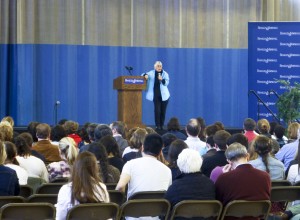By Eric Acre, Staff Writer ||
Attendees of Thursday’s Common Hour were treated to the thoughts and observations of Cynthia Enloe, a renowned feminist and research professor in the international development, community, and environment department at Clark University.
Her talk, entitled “Tracking the Militarized Global Sneaker,” explored the ongoing discrimination in today’s world against the value of women’s labor. She described how female labor is made cheap in globalized industry and how militaristic societies have enabled this trend to continue. In order to convey her arguments, Enloe used sneaker factories as a prime example.
Enloe has completed Fulbright scholarships in Canada, Britain, and Japan and lectured in Iceland, Sweden, Norway, Germany, Korea, Turkey, and many universities across the United States. She was awarded honorary doctorates by the University of London, the University of Lund in Sweden, and Connecticut College.
In addition, Enloe has authored 14 books, including The Curious Feminist: Searching for Women in The New Age of Empire in 2004, and Bananas, Beaches, and Bases: Making Feminist Sense of International Politics in 2000. She presides on the editorial boards of several academic journals and has appeared on the BBC, C-Span, and NPR.
Enloe began her speech by thanking the women’s and gender studies program for sponsoring her visit.

“It might be a good time to talk about the global politics… of sneakers,” Enloe said. “The reason why I got interested in sneakers is because I’m interested in women working in factories.”
She explained that women began working in factories in the 1800s in Colchester, England. This was the first time that a male factory owner had the idea that women would be the best factory workers. With the advent of globalization, this concept has spread across the world, with many countries adopting the thought that women are the most apt to make shoes, electronics, clothing, and toys.
“There is no such thing as cheap labor,” Enloe said. “What there is, is there is labor made cheap.”
Enloe said the question at hand is whose labor is being made cheap. The answer was clearly women, which she reinforced by citing a graphic from the Lancaster Intelligencer newspaper, which revealed that women, on average, make roughly 77 cents on each dollar that a man makes. In Lancaster county, women make roughly 59 cents on the man’s dollar, one of the lowest rates in Pennsylvania.
“So, how do you go about making women’s work in Lancaster County cheap?” Enloe asked the audience. “How do you go about making Chinese women’s Labor in a Nike factory cheap? How do you go about making women’s labor in the Indonesian Adidas factory cheap?”
Enloe said that to reduce the value of women’s labor, people must wield sexist ideas about femininity.
“It’s not just about having empowered supervisors who keep you in line,” Enloe said. “It is ideas about why women work, and what they are worth.”
This, she emphasized, is the main method of making women’s labor cheap. If factory owners argue that what women do in a factory, including sewing precise hems in denim and other tasks requiring extreme precision, is not skilled labor, they are able to reduce the price of that labor and pay women less than male workers. Other ideas about femininity include that women naturally know how to do tasks like sewing and, as such, do not need to be paid more for their skills.
Other arguments include the ideas that women are incapable of operating heavy equipment and are not committed to their careers. Employers often assume that women will quit working as soon as they get married and, as a result, pay them lower wages and deliberately lay them off when that time comes.
Enloe argues that these ideas are oppressing women across the world, giving them little upward mobility and less equality in the labor market. Women are working for lower pay in toxic factory environments and outdated social views ensure the continuation of this oppression.
First-year Eric Acre is a staff writer. His email is eacre@fandm.edu.